Are Business School Neighborhoods Becoming More Gentrified?

When universities are found in downtown urban areas, gentrification most often follows. It almost seems inevitable since universities bring in more individuals with higher education, draw in more money, and increase new businesses. But what does the rapid increase of gentrification statistics mean for the business school students looking to start their career in a new area?
What Is Gentrification?
First, we need to look at what gentrification is. In simple terms, it’s the influx of more affluent residents moving into urbanized neighborhoods. At the outset, it may sound good, but it can be controversial.
Gentrification may improve the financial quality of a neighborhood, but it can also force the relocation of current residents and businesses due to increasing costs. Often, the process of gentrification also shifts a neighborhood’s racial and ethnic composition, as well as the average household income. This can lead to community displacement for lower-income families in gentrified areas, some of which often live in the area for several generations.
However, there is a grey area. Gentrification happens when a location becomes increasingly attractive. At that point, more high-income individuals move into the area bringing in investments in the community and leading to improved infrastructure and economic development.
What Causes Gentrification?
According to a recent comprehensive review of gentrification completed by researchers at UC Berkeley and UCLA, gentrification most often occurs when more public transportation is available. People are more attracted to transit hubs because they allow more privileged groups to trade car commutes for transit and signal a large-scale commitment to neighborhood upgrading, which, in turn, leads to increased employment opportunities.
Another spur to gentrification is education. Quality schools, universities, colleges, and medical centers tend to shape gentrification. The substantial federal support that public universities receive brings money into neighborhoods through many means including housing and housing subsidies for faculty and staff. A CityLab study revealed that universities and other academic institutions are key to attracting the creative class, creating more market demand and political pressure for better amenities, schools, and other services.
Analyzing University Neighborhood Gentrification Statistics
Since universities have such an impact on gentrification, we thought we’d take a look at what areas and schools have been most affected. While gentrification is not something most urban areas should aspire for, it happens, and it’s important to know where it’s occurring the most.
To find out, we looked at a recent study by RentCafe of the most gentrified areas in the U.S. The study took a look at the 2000 Census and the 2016 American Community Survey to see the changes that took place over a decade and a half across 1,000 U.S. ZIP codes. The study found that there are easy ways to quantify gentrification statistics when looking at median home value, median household income, and the population that holds a bachelor’s or higher degree.
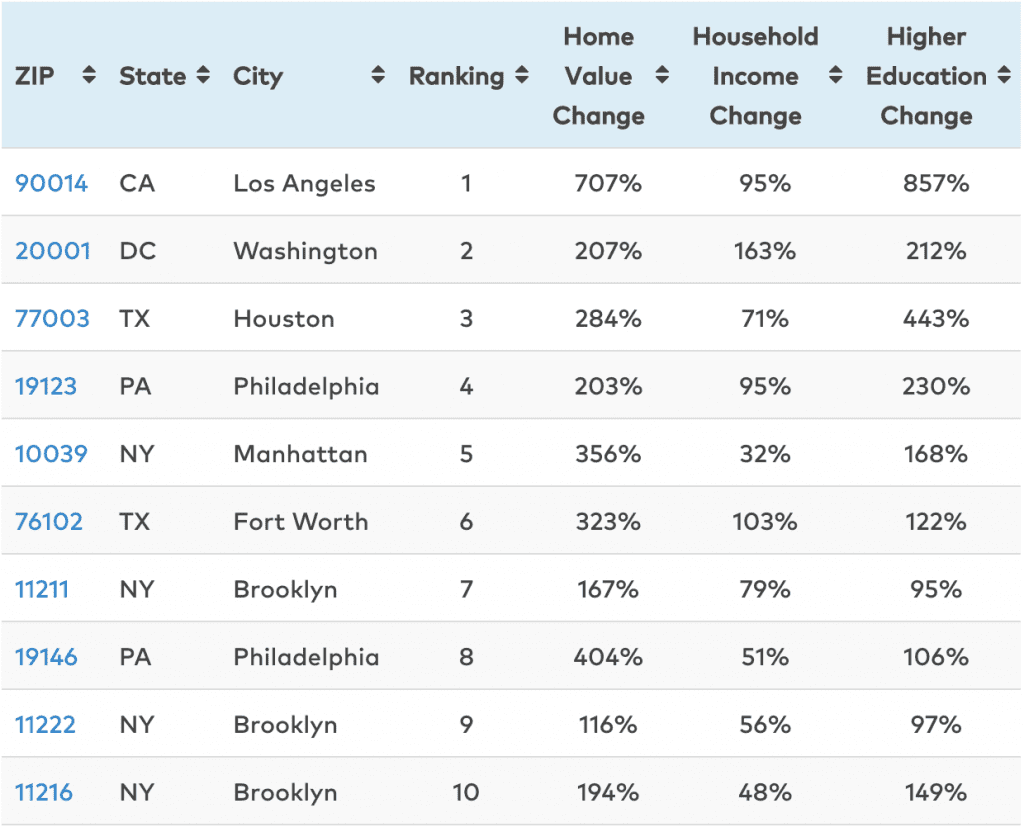
Based on the results of the study, we analyzed the top five MetroMBA universities in gentrified areas.
-
University of Southern California
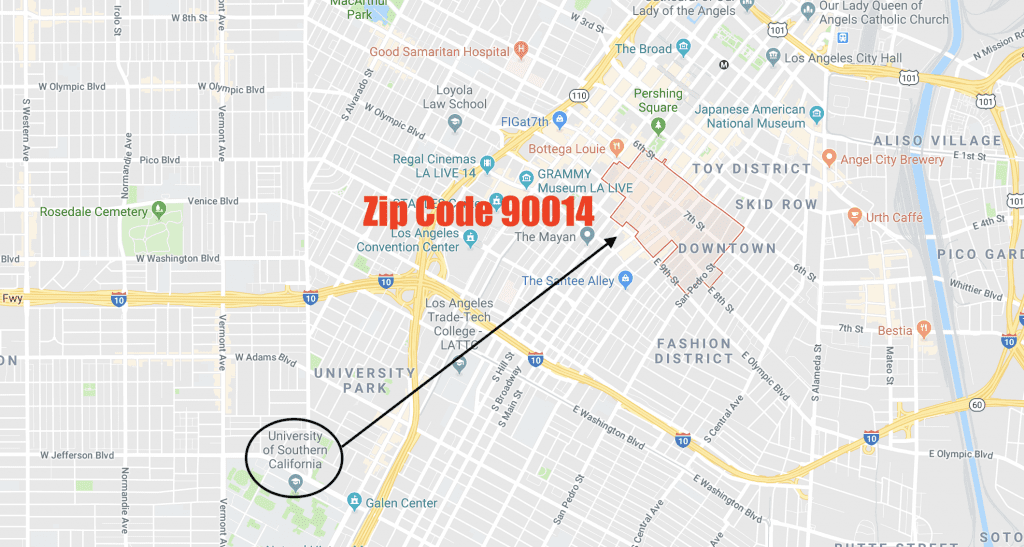
Located less than five miles away from ZIP code 90014 in Los Angeles, USC Marshall is just on the edge of the most gentrified area in the U.S. Over the last 16 years, this area has witnessed:
- A 707 percent increase in home values
- A 95 percent increase in median household income
- And an 857 percent increase in people holding bachelors or higher degrees
So, while some at USC might be fighting gentrification, it may not be working. Just last year, USC opened up a brand-new $700 million USC Village with a Target Express, Trader Joe’s, and 15 restaurants, transforming the surrounding neighborhood. And even though as part of the development USC provided $20 million for construction of off-site subsidized housing, there are still concerns.
“Across the street, land values are going to increase,” Joe Donlin, Associate Director of Strategic Actions for a Just Economy, told KPCC. “We know the landlords are going to rent at higher levels of rent.”
-
Howard University
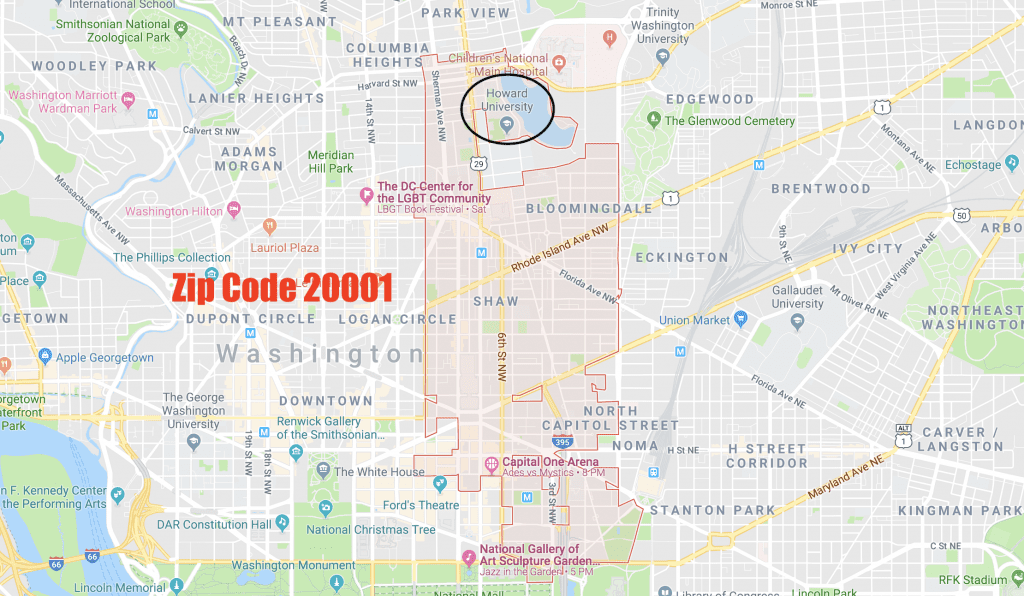
Located in Washington, D.C. Zip Code 20001, Howard University’s campus is located directly in the second most gentrified area in the U.S. Over 16 years, the area has witnessed:
- A 207 percent increase in home values
- A 163 percent increase in median household income
- And a 212 percent increase in people holding bachelors or higher degrees
The gentrification statistics of the Howard University area hasn’t gone unnoticed. According to NPR, there has been a drastic change:
“The area, located just a couple of miles north of Capitol Hill, was once working-class and black. But as hundreds of new residents move to D.C. each month, more non-black residents move into Howard’s neighborhood. And as property values rise, the university is trying to capitalize on the hot real estate market.”
-
University of Houston — Downtown
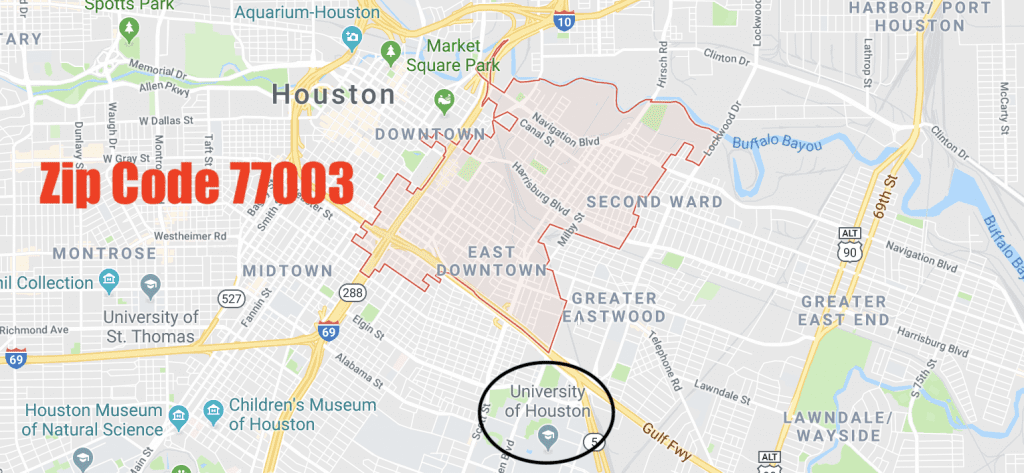
Located just steps away from zip code 77003, The University of Houston campus is located near the third most gentrified area in the U.S. In the last decade and a half, the area has seen:
- A 284 percent increase in home values
- A 71 percent increase in median household income
- And a 443 percent increase in people holding bachelors or higher degrees
Much of the gentrification can be laid at the university’s feet as its student housing footprint has expanded into surrounding neighborhoods over the last decades. According to the Houston Chronicle, “In the portion of the neighborhood closest to downtown, which includes Emancipation Park, median home values increased 176 percent between 2000 and 2013, according to an analysis of census estimates conducted by Governing.”
-
University of Pennsylvania
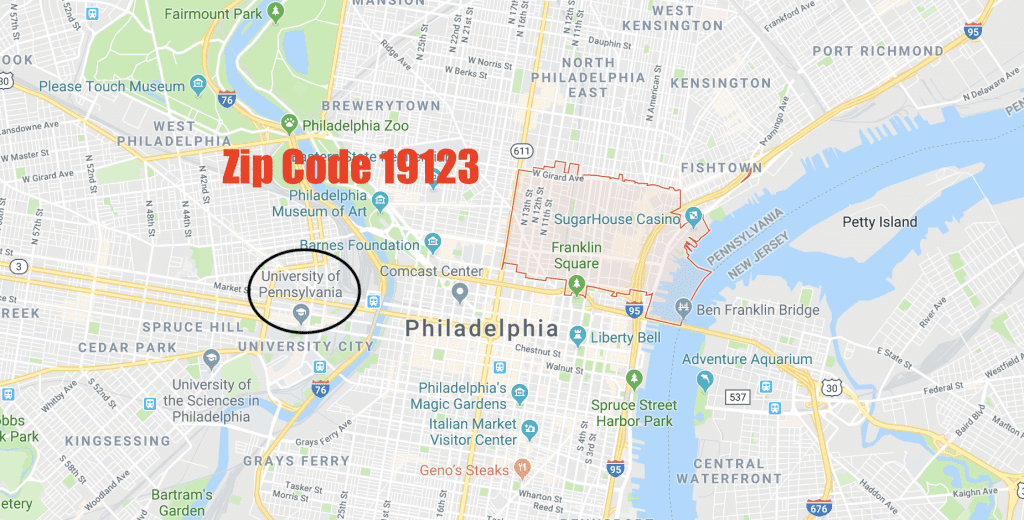
The Wharton School at UPenn is less than five miles outside the fourth most gentrified neighborhood in the country: zip code 19123. This area, over the last 16 years, has noticed:
- A 203 percent increase in home values
- A 95 percent increase in median household income
- And a 230 percent increase in people holding bachelors or higher degrees.
In fact, UPenn has had a complicated history with gentrification over the years, dubbed Penntrification by some. The problem, according to The Daily Pennsylvania, is that in West Philadelphia Penn students’ demand for housing is displacing low-income families. There have even been protests criticizing the university for causing gentrification in the area.
-
Texas Christian University

Fort Worth, TX, contains the sixth most gentrified area in the U.S.; just two miles away from Texas Christian University (TCU). Over 16 years, the area has witnessed:
- A 323 percent increase in home values
- A 103 percent increase in median household income
- And a 122 percent increase in people holding bachelors or higher degrees
While Fort Worth’s growth has brought new life to the city’s urban core, it’s also sky-rocketed property values. In particular, the areas around TCU are growing quickly. The university recently completed a $100 million renovation for its football stadium—just five years after its last overhaul, which reportedly cost $164 million.
The Best Healthcare Management MBAs in Texas

As the nation’s second-largest field of employment, healthcare is a fast growing and rapidly changing industry expected to be worth trillions in the near future. A job in healthcare can represent any number of opportunities from working in a hospital to working for a government agency, insurance organization, consulting firm, group practice, pharmaceutical company, or biotechnology firms. In each of these areas, there’s a massive need for well-qualified individuals who can respond to critical problems. That’s where a healthcare management career can be valuable.
As a healthcare manager, you’ll be responsible for managing and coordinating health services while working closely with physicians and administrators to best represent your facility. It’s a rewarding career field with a positive job outlook—employment is expected to grow much-faster-than-average, according to the Bureau of Labor Statistics.
If this sounds like the career for you, one of the first steps is to earn your Healthcare Management MBA. A Healthcare Management MBA provides students with in-depth expertise on the unique elements required to work in the healthcare industry.
As for where to earn your degree, here are the best Texas healthcare MBA programs.

Dallas
Naveen Jindal School of Management – University of Texas at Dallas
In Dallas, the Naveen Jindal School of Management is known for its healthcare focus. Not only does the school offer a Master of Science in Healthcare Leadership and Management, which is a flexible evening program that can be completed in 18 to 24 months, but MBA students can also choose the Healthcare Leadership and Management concentration. This MBA concentration prepares students for leadership positions in healthcare and is a cross-functional and industry-focused option.
What makes the Healthcare Management MBA concentration stand out at Naveen Jindal is the fact that classes are taught by faculty and healthcare executives who have the specialized expertise and experience needed to train up-and-coming graduates. In addition, students can participate in the Healthcare Management Association (HMA) to cultivate industry experience, networking opportunities, and healthcare resources. The school also offers a Healthcare Management Executive MBA for current physicians who are looking to expand their skillset.
Hankamer School of Business – Baylor University
At the Baylor University Hankamer School of Business in Dallas, there’s a specialized MBA in Healthcare Administration. This degree path is offered in conjunction with the Robbins Institute for Health Policy and Leadership and gives students the opportunity to gain an interdisciplinary foundation in health services and business. The MBA program is nationally recognized, ranked 17th in the nation in 2016 by the U.S. News & World Report, and ideal for students interested in a healthcare career.
What makes this MBA program unique is that it includes a seven-month paid Executive Residency with a leading progressive health organization. During this residency, students receive guidance from well-qualified, practicing healthcare executives who give them the opportunity to apply and test their knowledge. Also, students can apply for the Executive Healthcare MBA program in Dallas and participate in the Future Healthcare Executives (FHE) student organization.
Neeley School of Business – Texas Christian University
Another opportunity for healthcare-minded MBA students in Dallas is the Healthcare MBA at the TCU Neeley School of Business. This program is designed for current healthcare professionals or individuals who are looking to enter the healthcare industry. It’s offered in partnership with the University of North Texas—Health Science Center and provides an in-depth healthcare focus.
What makes this program unusual is that students can choose a standard MBA (48 credit-hours) or an accelerated MBA (36 credit-hours) depending on their experience in business. In either case, MBA students completed 10.5 credit-hours of healthcare-specific courses as well as 9-10.5 credit-hours of additional business or healthcare electives. Some of the specialized courses include:
- Healthcare in the U.S.
- Population Health
- Legal Aspects of Healthcare
Houston
Rice University – Jones Graduate School of Business
At Rice University in Houston, there are multiple opportunities for MBA students at the Jones Graduate School of Business to develop their healthcare experience. Specifically, the school created a healthcare program that offers practical learning options and multiple healthcare electives. Some of those electives include U.S. Health Care Management, Health Care Strategy, and Health Care Operations Management.
As full-time MBA students, there’s the option to choose the health care concentration, which includes 12 credits, out of 24.5 available, focused specifically on a career in healthcare. Its unique curriculum prepares MBA students for a variety of healthcare settings including pharmaceutical, biotech, and insurance as well as hospitals and private practices. There are also many other ways to learn about healthcare at Rice University including speaker series, panel discussions, and multiple events.
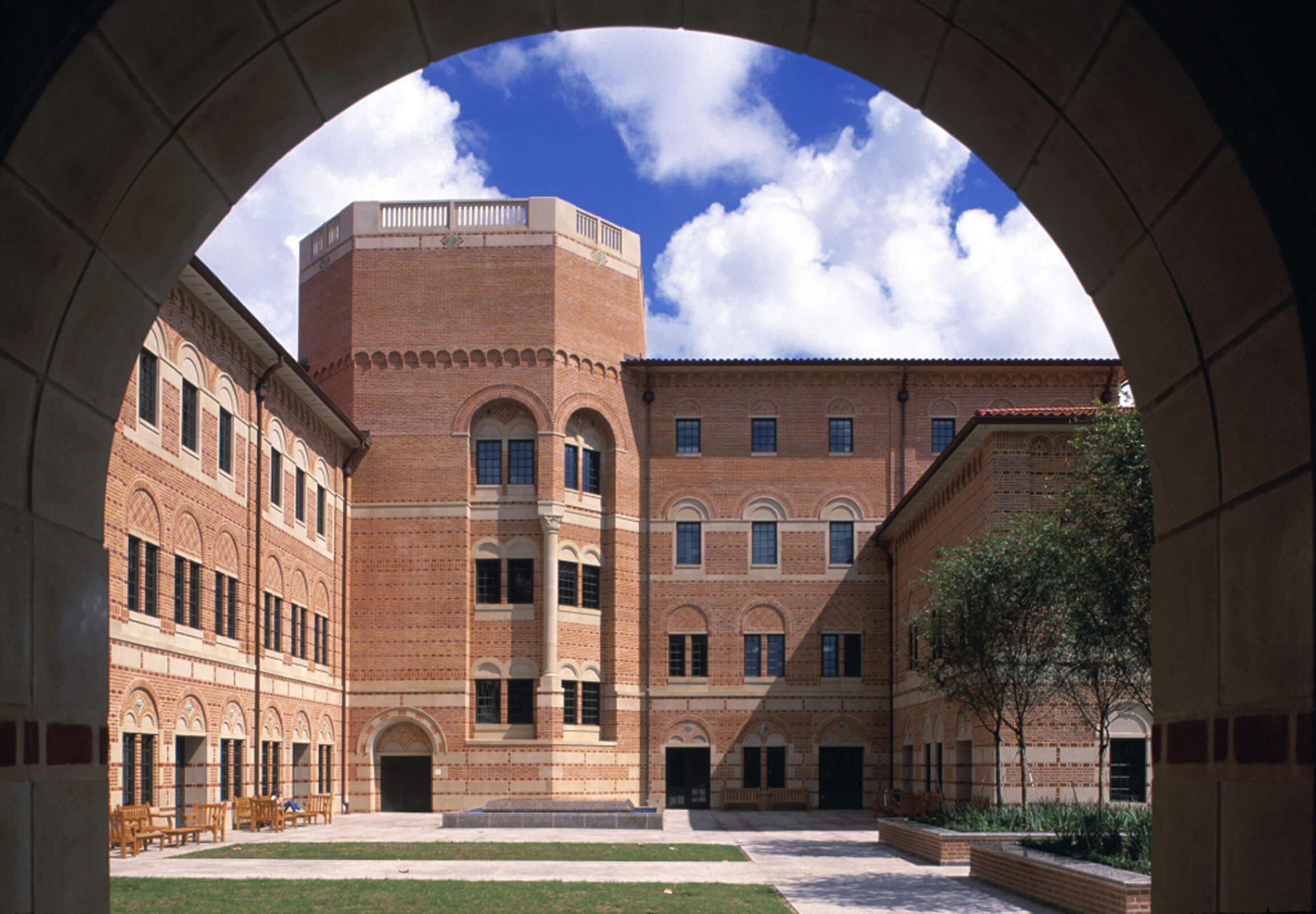
The Jones Graduate School of Business at Rice University offers a wealth of healthcare MBA options, including a MD/MBA dual degree.
Cameron School of Business – University of St. Thomas
In Houston, there’s also an MBA in Health Care Administration offered at the Cameron School of Business. This program is offered in conjunction with Texas Woman’s University (TWU) and gives students the opportunity to obtain the fundamental health services management skills required for a successful career. In addition, there’s an opportunity for a dual Master of Healthcare Administration (MHA) and MBA degree. As part of the program, students take courses at both TWU and UST.
The Texas MBA Programs Guide: Houston vs. Dallas

If you’re looking to earn a Texas MBA, where should you go to school? Should you choose a top MBA program in Dallas or Houston? First, we need to take a look at the cities.
Living in Dallas vs. Houston
First, let’s take a look at the cost of living in Dallas vs. Houston. According to Numbeo, the world’s most extensive database containing user contributed data about cities, the overall cost of living is relatively similar: $4,242 in Houston compared to $4,000 in Dallas. Houston barely edges out Dallas with a slightly higher cost of living, and here’s how that’s broken down.
- Consumer Prices: 35 percent higher in Houston
- Rent Prices: 7.30 percent higher in Houston
- Restaurant Prices: 27 percent higher in Houston
- Groceries Cost: 95 percent higher in Houston
- Local Purchasing Power: 26 percent lower in Houston
Other things to consider when choosing between Dallas and Houston include:
- Industries
- Houston is known for being the oil capital and is an ideal location for jobs in the energy industry.
- Dallas, on the other hand, is known for real estate (Tramelle Crow is headquartered here), as well as hedge funds and asset management firms.
- Economic Development: According to Site Selection Magazine, Houston and Dallas are comparatively equal when it comes to economic development, ranking second and third respectively.
- Top Companies: Houston edges out Dallas for being home to more Fortune 500 companies. In fact, Houston is home to 27 top companies compared to 14 in Dallas. However, they rank second and third respectively.
However, according to Forbes, “while Houston and Dallas have decent amenities (and having better ones surely wouldn’t hurt), they aren’t places that offer a unique lifestyle brand, such as charming architecture or a cutting-edge arts scene.”
Texas MBA Programs
The next step is to compare the top three MBA programs in each city. In particular, we wanted to take a look at the tuition rates (two years), GMAT averages, and post-graduation salaries at each program in each city to get a well-rounded picture.
Overall, there are a few things to note right away.
- The top full-time MBA programs in both cities are ranked well. However, Houston programs tend to rank higher on major ranking sites such as The Economist and Bloomberg Businessweek.
- Houston tends to be more expensive regarding tuition ($93,052 vs. $69,191), but it also pays a higher salary ($110,000 vs. $92,000). This balances out with around a $25,000 difference in tuition and a $20,00 difference in post-graduation salary.
- Finally, GMAT averages for class profiles tend to be higher in Houston as well (688 vs. 660).
Here’s how it all breaks down per school.
Top 3 Houston MBA Programs
McCombs School of Business – University of Texas at Austin
The McCombs School of Business offers a full-time MBA, an Evening MBA, a Weekend MBA, and an Executive MBA program. And it’s considered one of the top business schools in the country, consistently ranking highly on various lists, including ranking 28 according to The Economist.
- Tuition Rates (two years): $91,000
- GMAT Averages: 703
- Post-Grad Salaries (Mean): $117,068
Rice University – Jones Graduate School of Business
The Jones Graduate School at Rice University offers a full-time MBA program, an MBA for Professionals (part-time), and an Executive MBA Program. The school’s full-time MBA program ranked 10th on the Bloomberg Businessweek list in 2017.
- Tuition Rates (two years): $116,000
- GMAT Averages: 711
- Post-Grad Salaries (Mean): $112,158
Mays Business School – Texas A&M University
The Mays Business School has both a full-time MBA program as well as a part-time Professional MBA program. In addition, the school offers an Executive MBA. In 2017, The full-time MBA program ranked 20th overall by Forbes, and 22nd overall by Bloomberg Businessweek.
- Tuition Rates (two years): $72,158
- GMAT Averages: 649
- Post-Grad Salaries (Mean): $103,299
Top 3 Dallas MBA Programs
Naveen Jindal School of Management – University of Texas at Dallas
The Naveen Jindal School offers a full-time MBA, part-time Professional MBA, Executive MBA, and Global Leadership Executive MBA program. The full-time MBA is well ranked according to the U.S. News & World Report, ranking 16th among public university programs in the U.S.
- Tuition Rates (two years): $27,603
- GMAT Averages: 678
- Post-Grad Salaries (Mean): $86,644
Cox School of Business – Southern Methodist University
The Cox School of Business at SMU offers a full-time MBA, Fast Track MBA, Professional MBA (part-time), and an Executive MBA program. Most recently, SMU Cox achieved its first Financial Times ranking at 91st.
- Tuition Rates (two years): $91,952
- GMAT Averages: 661
- Post-Grad Salaries (Mean): $96,587
Neeley School of Business – Texas Christian University
At the Neeley School of Business at TCU, MBA applicants can apply to the full-time MBA, Accelerated MBA, Professional MBA (part-time), Accelerated Professional MBA, or MBA for Energy Professionals program. The Economist ranked the Neeley School MBA ranks 61st overall on its most-recent ranking.
- Tuition Rates (two years): $88,020
- GMAT Averages: 640
- Post-Grad Salaries (Mean): $93,010
Dallas vs. Houston Breakdown in Charts
When breaking down the data between MBA programs in Dallas and Houston, here’s what it looks like:
Texas MBA Tuition
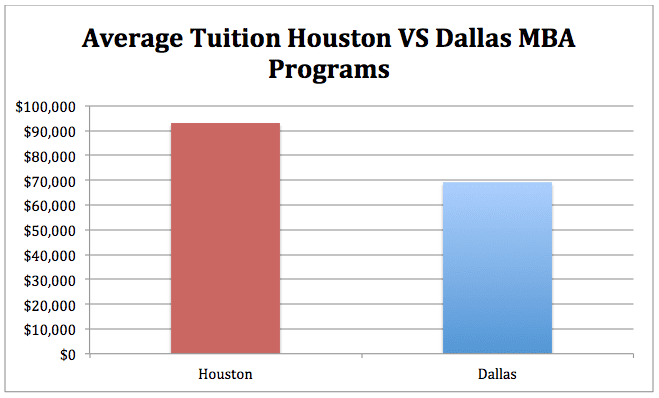
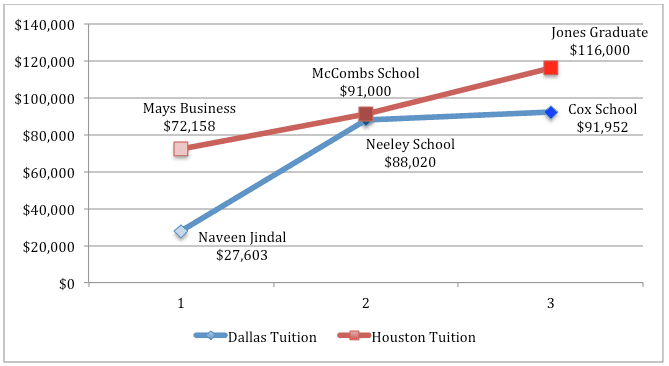
Texas MBA GMAT Averages
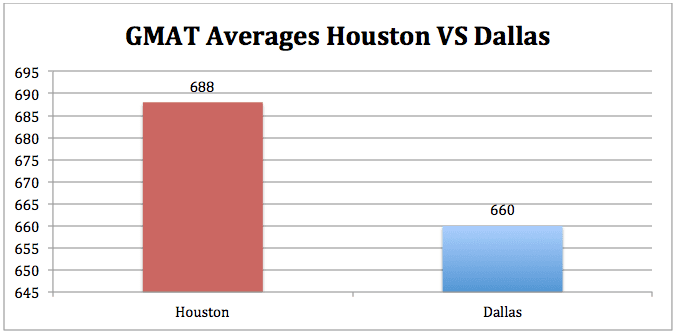
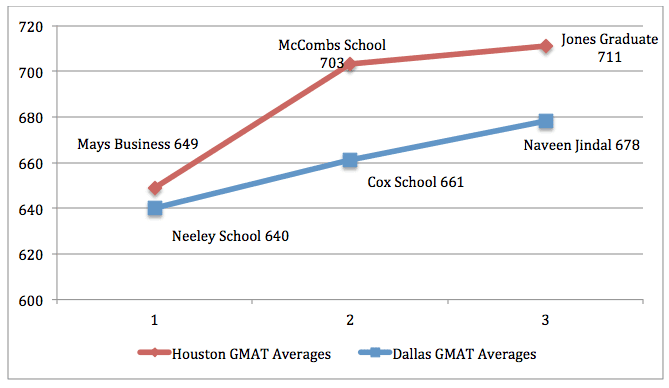
Texas MBA Post-Graduation Salaries
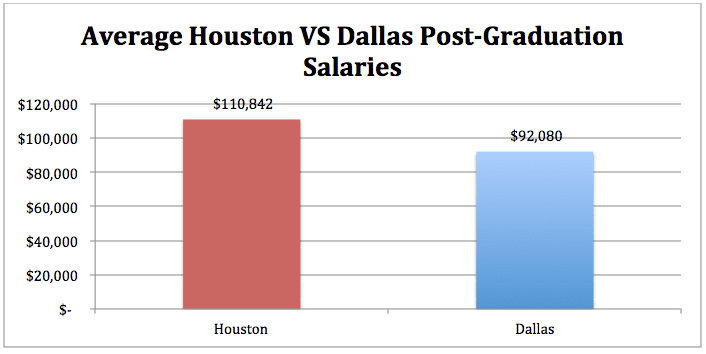
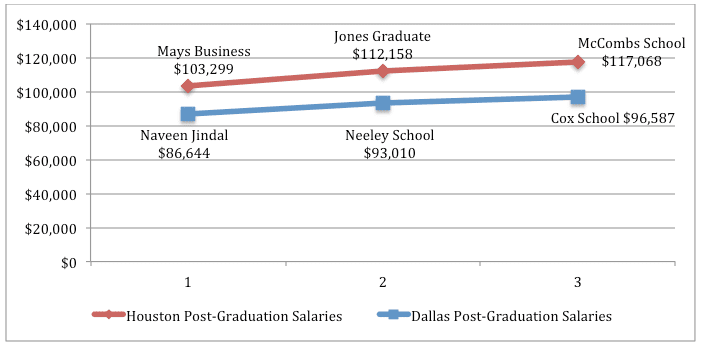
Chicago Booth, Michigan Rise in New U.S. News Business School Ranking

The new, official U.S. News & World Report ranking of the best business schools in the United States has been released, with some minor shake-ups at the top. For the second year in a row, Harvard Business School remains tied for the first overall in the ranking. However, the University of Chicago Booth School of Business officially supplanted The Wharton School at the University of Pennsylvania, which fell back from its tie at the top to third overall.
The rest of the top ten, as we previously mentioned, largely resembled last year’s U.S. News release, except for the inclusion of the Ross School of Business at the University of Michigan and the exclusion of the Yale School of Management. Surprisingly, Michigan Ross may have made the strongest showing in the newest ranking, not only managing a position in the top 10, but landing tied for seventh overall—ahead of Columbia Business School and the Dartmouth Tuck School of Business. The Yale School of Management slipped to a tie at 11th overall with Duke University’s Fuqua School of Business.
U.S. News & World Report 2019 Best Business School Rankings
| Rank | School |
|---|---|
| 1st (Tied) | Harvard Business School |
| 1st (Tied) | University of Chicago Booth School of Business |
| 3rd | The Wharton School at the University of Pennsylvania |
| 4th | Stanford GSB |
| 5th | MIT Sloan School of Management |
| 6th | Northwestern University Kellogg School of Management |
| 7th (Tied) | University of Michigan Stephen M. Ross Business School |
| 7th (Tied) | UC Berkeley Haas School of Business |
| 9th | Columbia Business School |
| 10th | Dartmouth College Tuck School of Business |
Chicago Booth, Michigan Shine Among Rising Full-Time MBA Programs
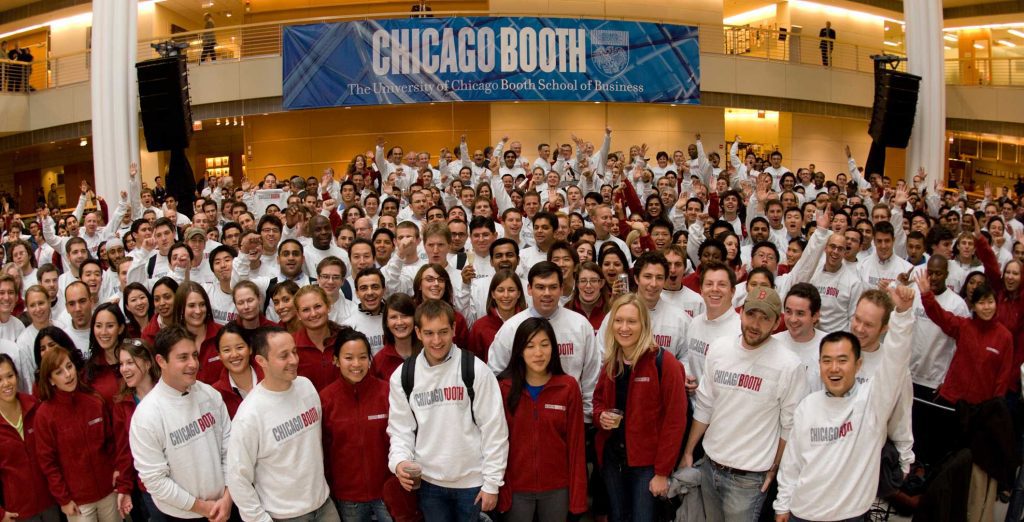
For the first time in school history, the Booth School of Business secured its place atop of the U.S. News ranking (albeit tied with HBS). In a statement, Booth Dean Madhav Rajan noted, “We are pleased to be recognized in this manner, and gratified that the recognition is across the board. We continue to strive to be the pre-eminent academic school of business.”
After its place among the top ten business schools was revealed, Michigan Ross Dean of Business Scott DeRue stated in a release, “We are excited to once again be ranked among the top 10 MBA programs in the country by U.S. News & World Report. This recognition is a testament to the extraordinary talent at Michigan Ross, our innovations in action-based learning, our partnerships with leading companies across the globe, and the most supportive alumni community in the world. We are developing leaders who have the character and capabilities to transform the world through business, and it’s an honor to be recognized among the very best in the world.”
On its website, the school also proudly boasted that, outside of Stanford GSB, no business school in the ranking earned more top ten placements in specialty areas, earning high grades for: “Accounting (No. 4), Entrepreneurship (No. 7), Finance (No. 10), International (No. 5), Management (No. 3), Marketing (No. 4), Non-Profit (No. 5), Productions/Operations (No. 3), and Supply Chain (No. 6).”
Outside of the top ten, the USC Marshall School of Business watched its stock rise again this year. Two years ago, U.S. News handed USC Marshall the 31st spot on its best business school ranking, which jumped to 24th last year, and 20th this year. Just a few spots back of USC was the Jones Graduate School of Business at Rice University, which saw the largest leap of any of the top 25 schools—jumping six spots from the previous year.
Nine schools among the top 100 in the new rankings managed to jump at least ten spots, including three MetroMBA favorites: the Whitman School of Management at Syracuse University, the Neeley School of Business at TCU, and the Fordham School of Business at Fordham University. Whitman, in fact, tied for second highest rise, improving 18 spots overall from last year’s 88th overall placement to 70th this year. No school improved more, however, than the Weatherhead School of Management at Case Western Reserve University in Cleveland, Ohio, which improved a remarkable 22 spots from last year’s 77th overall placement to 55th this year.

The Syracuse University Whitman School of Management jumped 18 spots in the most recent U.S. News “Best Business Schools” ranking.
A handful of schools also secured a spot in the top 100 after not appearing at all the previous year, including the Howard University School of Business, the American University Kogod School of Business, and Argyros School of Business and Economics at Chapman University.
Which Schools Fell The Hardest?
Along with the Yale School of Management losing its prestigious top ten status, a handful of schools tumbled in the 2019 ranking—with some virtually flat-lining. No school fell more than the Poole College of Management at North Carolina State University, slipping an astounding 35 spots from 55th last year to 92nd this year. Eleven schools lost their top 100 status in total. The reasoning behind the sudden drops are likely linked to the publication’s change in how it ranks the business schools.
In regards to the ranking methodology, U.S. News placed less value in test scores and student GPA. In a release this afternoon, U.S. News reported the following:
“For the first time U.S. News reduced the value of reported GPA, GRE and GMAT scores for full-time and part-time MBA programs and GRE scores in the education rankings if less than 50 percent of an entering class submitted these scores. U.S. News believes this lack of data means the scores are not representative of the entire class.”
The change, arguably, could stem from the fallout of the Temple University Fox School of Business, which was knocked off all of the publication’s rankings for the 2018 calendar year because of falsely reported data regarding test scores.
Stay tuned to MetroMBA on all the biggest MBA ranking news.
MBAs Profit As Paid Consultants through TCU Neeley & Associates

At the Texas Christian University Neeley School of Business’ Neeley & Associates, MBAs have the chance to gain more than just hands-on business experience as paid consultants for major companies.
The Neeley & Associates are a group of MBA student consultants who can earn both business experience and a paycheck by offering insights and strategies for major companies facing business challenges. The students act as principle consultants, but are are provided with ample resources and guidance in the form faculty, staff, and professional consultants.
The program benefits both students looking to gain experience and the companies, who are able to find affordable and innovative solutions to their challenges. Past clients have ranged from PepsiCo. to Nike to GM Financial, and all of the consulting is paid work.
Many students have since been hired or offered internships at the companies for which they served as consultants. Others simply found that the consulting experience on their resume gave them a competitive edge on the job market. “Few candidates have ever done a consulting project. It gave me examples of how I creatively overcame a difficult challenge for a major company,” Greg Goolsby said of his Neeley & Associates experience. Graduating with his MBA in 2008, Goolsby currently serves as the senior licensing and acquisition manager at FUNimation.
Ed Riefenstahl, Director of Experiential Learning at Neeley, also commented on the many benefits the program has for students. “In addition to applying new knowledge from the classroom, Neeley & Associates MBAs get to experience and develop skills that are applicable and beneficial to the rest of their careers.”
TCU Neeley Management Professor Michael Hitt Earns Career Achievement Award

A Distinguished Research Fellow at the Texas Christian University – Neeley School of Business, Michael Hitt, has received the Career Achievement/Distinguished Educator Award for his many contributions to the field of management throughout his career.
Hitt was presented with the award this year at the annual meeting for the Academy of Management. The award, one of the highest honors the Academy can give, was given in recognition of Hitt’s long career and service to the field of management through research, breakthrough developments, and innovative teaching methods.
“Letters of support from former students show Michael’s engagement and ongoing support for his students—encouraging everyone to be the best they could be, and going above and beyond to help them get there,” said one committee member who selected Hitt for the award.
Over his 40 years of teaching and research, Hitt has left his impact on the field of management in a number of ways. This is not the first time Hitt has been honored by the Academy of Management, however. He received the Irwin Outstanding Educator Award from the organization and being named as a “Thomas Reuters Highly Cited Researcher.” He has also served in different capacities for several scholarly journals, acting at one time as editor for the Academy of Management Journal, co-editor for the Strategic Entrepreneurship Journal, and with research published in a number of premier journals such as Organization Science, the Journal of International Business Studies, and many more.
Before coming to TCU, Hitt was a teacher at Texas A&M University, where he was the University Distinguished Professor Emeritus. He holds a BBA and MBA from Texas Tech University and a Ph.D. in organizational theory/behavior, quantitative methods in economics, and business policy from the University of Colorado.
